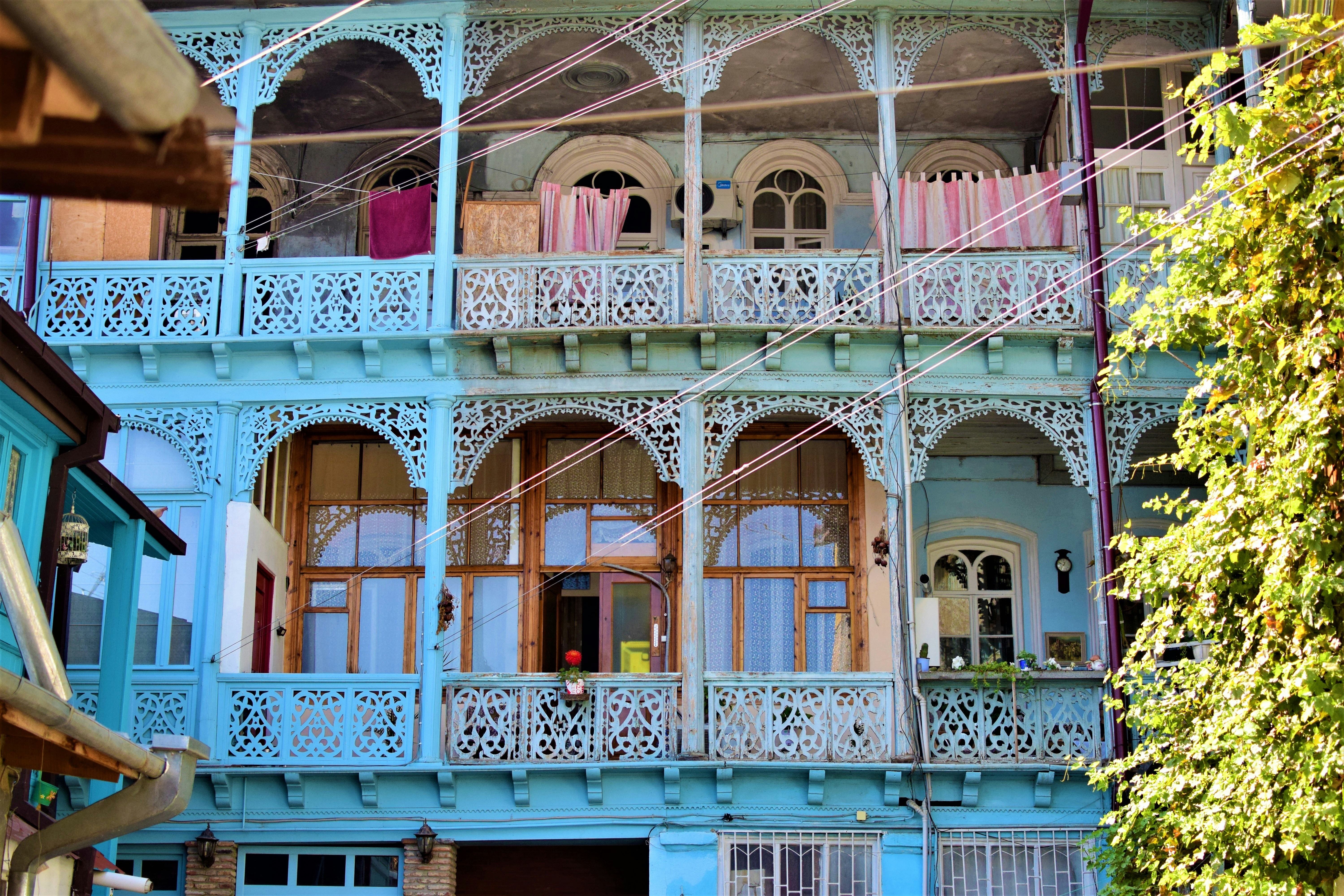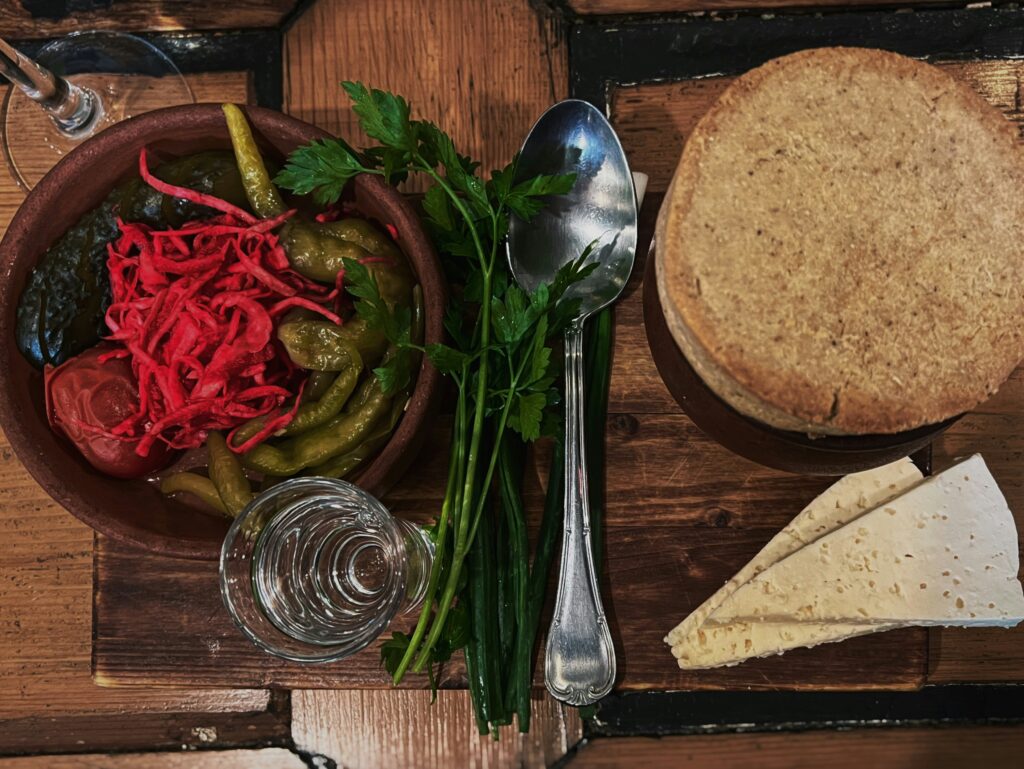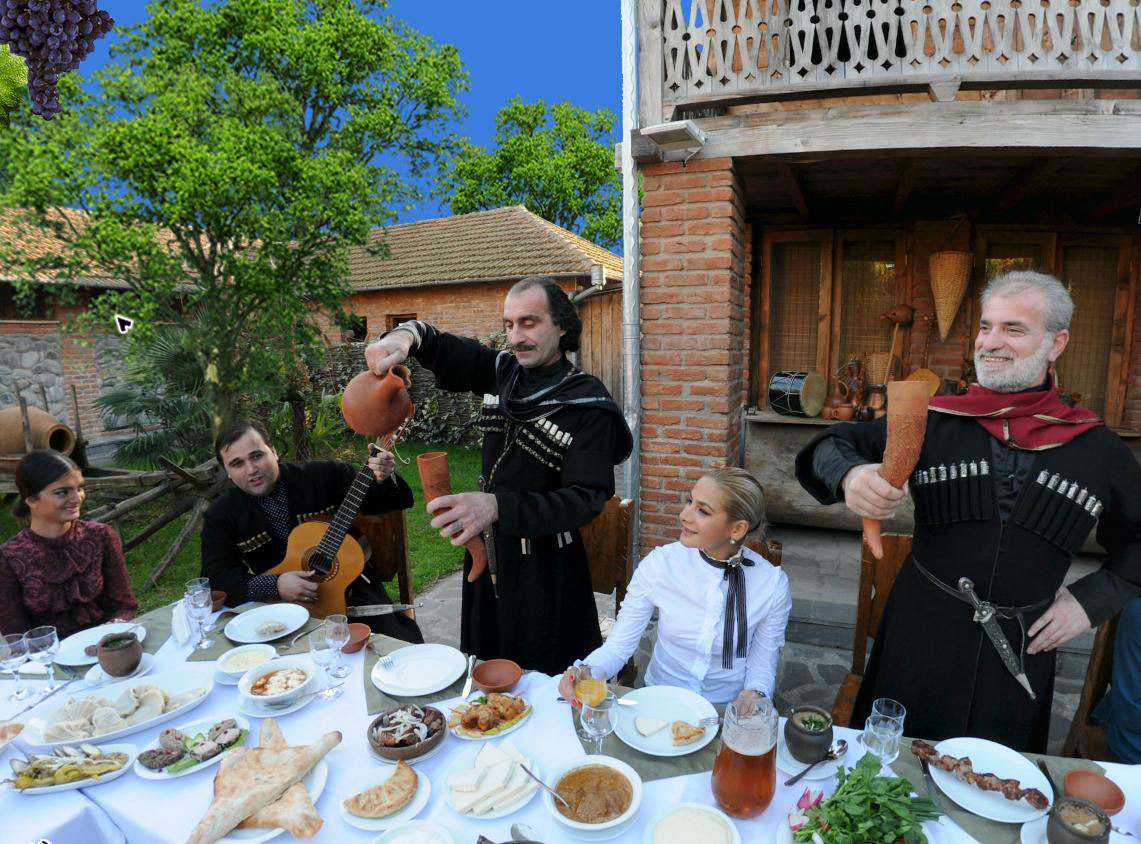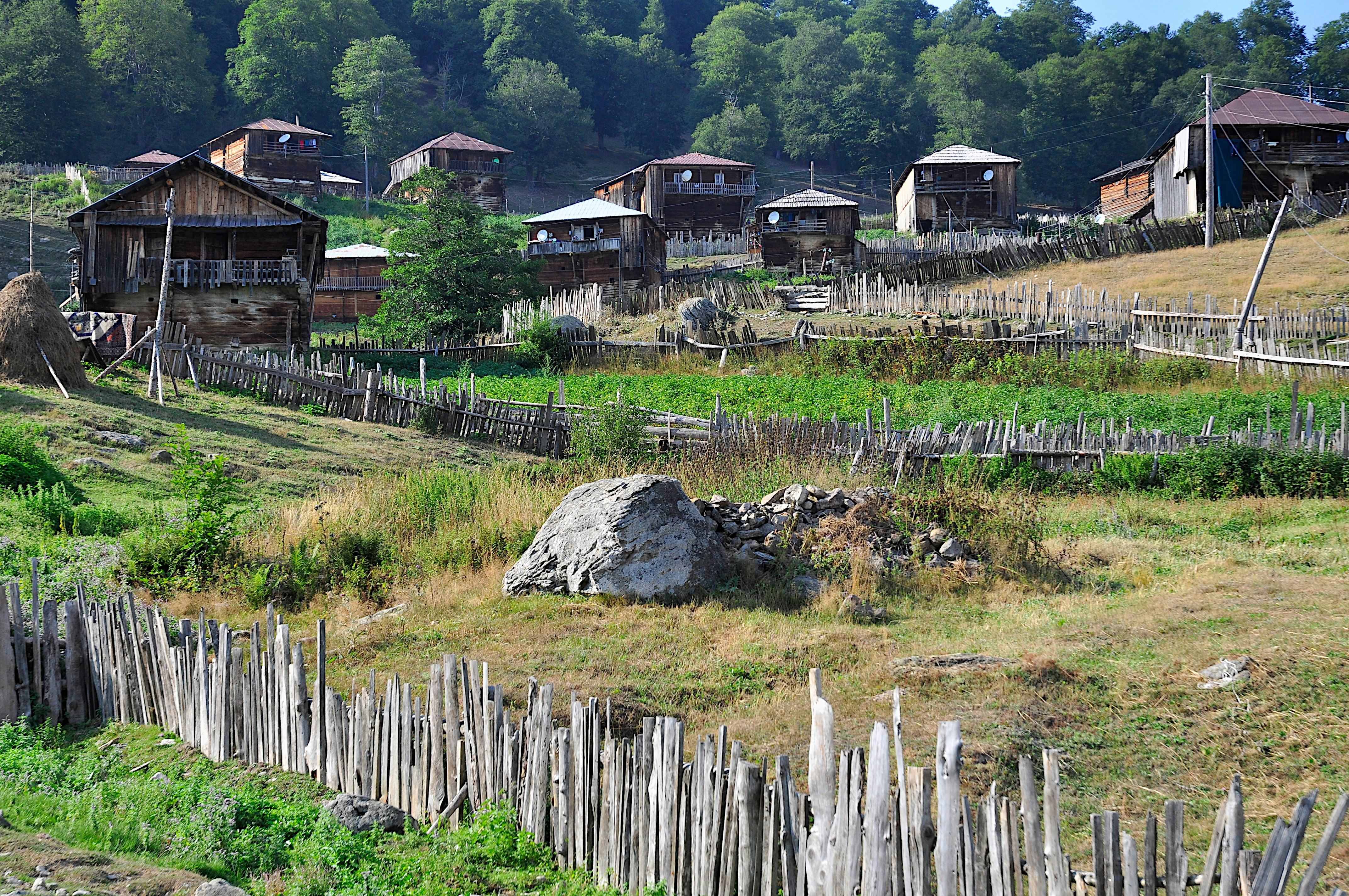
Georgian Hospitality
Georgia, nestled between the Caucasus Mountains and the Black Sea, is not only known for its breathtaking landscapes, ancient cultural heritage, and rich winemaking traditions, but also for its legendary hospitality. The warmth and generosity of the Georgian people, combined with unique cultural traditions of welcoming guests, make Georgia an unparalleled destination for travelers seeking authentic human connections. This guide explores why Georgia’s hospitality is a compelling reason to visit the country, and how this warmth is woven into the very fabric of Georgian society.
The Concept of “Guest as a Gift from God”

Central to Georgia’s reputation for hospitality is the deeply ingrained belief that guests are blessings. In Georgian culture, a guest is considered a “gift from God”, a principle that has been passed down through centuries of tradition. This belief forms the foundation of how Georgians treat their visitors, ensuring that travelers are not just welcomed, but honored.
- Welcoming Strangers: Whether you’re a friend or a complete stranger, Georgians will go out of their way to make you feel comfortable and cared for. It’s common to be invited into someone’s home, offered a meal, or even a place to stay if you’re traveling in rural areas.
- Generosity and Openness: Even in the smallest villages, Georgians will share what they have, no matter their means. The idea of hospitality isn’t about material wealth but about creating bonds and showing kindness.
a. Supra: The Traditional Georgian Feast
At the heart of Georgian hospitality lies the supra, the traditional Georgian feast that brings people together around the table. The supra is not just about food and drink, but about celebrating life, friendship, and community through toasts, storytelling, and deep conversations.
- The Role of the Tamada: At every supra, there is a tamada, or toastmaster, who leads the gathering by offering heartfelt toasts on themes like family, love, peace, and unity. The tamada ensures that everyone feels included, fostering a sense of connection and celebration.
- Food and Wine: The supra showcases the best of Georgian cuisine, from khachapuri (cheese-filled bread) to khinkali (savory dumplings), and always features an abundance of wine, often homemade. The meal reflects the Georgian tradition of sharing abundance with guests.
b. Guest Rooms and Open Homes
It’s common for Georgians to dedicate a special room in their homes for guests, where visitors are treated with exceptional care. Even in modest homes, the best food and drink will be offered to guests, and hosts will go out of their way to ensure comfort.
A Deep-Rooted Tradition of Hospitality Across Regions

Georgia’s warm hospitality is not limited to any one part of the country. Wherever you travel, whether in the bustling streets of Tbilisi or the remote highlands of Svaneti, you will experience the same generosity of spirit. Each region, however, brings its own unique cultural nuances to welcoming visitors.
a. Tbilisi: The Capital of Warm Welcomes
In the capital city of Tbilisi, modern cosmopolitan life blends with deep-rooted traditions of hospitality. Despite its growing popularity as a travel destination, Tbilisi retains the warmth of a close-knit community where locals are always eager to engage with visitors.
- Coffeehouse Conversations: In the cozy cafes of the old town or the modern wine bars of Fabrika, it’s easy to strike up conversations with locals. Georgians are naturally curious about their guests, often eager to share stories, offer advice, or extend invitations to join a family meal.
- Old Town Charm: The historic neighborhoods of Tbilisi, with their narrow streets and wooden balconies, reflect the city’s openness. Walk around for just a few hours, and you’ll likely be invited for tea, wine, or even a full meal by friendly locals.
b. Svaneti: Ancient Traditions of Honor and Hospitality
The remote mountain region of Svaneti is known not only for its dramatic landscapes but also for the deep sense of honor tied to hospitality. In this region, customs of hospitality are still preserved from ancient times.
- Omalo and Ushguli: In the villages of Omalo and Ushguli, where life is still lived according to ancient rhythms, guests are treated with deep respect. Visitors are often invited to partake in family celebrations, and they are made to feel like part of the community.
- Defense of Guests: In traditional Svan culture, a guest’s well-being was considered sacred. If someone was taken into a Svan family’s home, they were under the household’s protection, a tradition that continues to this day.
c. Kakheti: Hospitality in the Heart of Wine Country
Kakheti, Georgia’s most famous wine region, is perhaps where the spirit of hospitality shines brightest. The region’s love for wine is matched by its love for sharing it, making Kakheti a place where guests are celebrated and welcomed with open arms.
- Winery Visits and Wine Tastings: Family-owned wineries, like Pheasant’s Tears and Shumi, invite travelers to not only taste wine but also share in the stories and traditions that have shaped Kakheti’s winemaking culture.
- Rtveli Harvest Celebrations: During Rtveli, the grape harvest festival, visitors are invited to join in the celebration, participate in the grape-picking process, and enjoy food, wine, and festivities with local families.
d. Adjara and Guria: Coastal Warmth and Friendliness
Along Georgia’s Black Sea Coast, the regions of Adjara and Guria offer a different but equally welcoming atmosphere. The subtropical climate is matched by the warmth of the locals, known for their laid-back and friendly attitude.
- Batumi: The vibrant city of Batumi is a melting pot of cultures, and its residents are known for their openness and friendliness toward visitors. Whether in a beachfront café or a family-owned guesthouse, the people of Batumi are always eager to share their stories and traditions.
Village Hospitality: In the smaller coastal villages of Guria, such as Shekvetili or Ureki, it’s not uncommon for travelers to be invited to join families for a beachside barbecue or a home-cooked meal. The closeness of community life makes guests feel like they are among old friends.
Georgian Cuisine: A Feast for the Senses and the Soul

Food plays a central role in Georgian hospitality. Sharing meals is not just about nourishing the body but about creating connections and expressing love and care for one another. Georgian cuisine is designed to be shared, and every meal becomes an opportunity for bonding.
a. Hearty and Diverse Dishes
Georgian cuisine is renowned for its hearty, flavorful dishes that vary from region to region but always focus on sharing. When guests are invited to dine, hosts will prepare an array of dishes to ensure that everyone is well-fed and happy.
- Khachapuri: This cheese-filled bread is an iconic Georgian dish that comes in several regional variations. Whether you’re in a rural home or a city restaurant, khachapuri is always a must-serve dish for guests.
- Khinkali: These large, juicy dumplings, filled with spiced meat or vegetables, are a communal dish that fosters interaction and conversation at the table.
- Pkhali and Lobio: Vegetarian guests are also treated with respect, with plenty of delicious options like pkhali (vegetable and walnut pâtés) and lobio (a flavorful bean stew).
b. Wine as a Symbol of Friendship
Wine flows freely in Georgian hospitality. As the cradle of wine, Georgia treats every bottle as an expression of connection and goodwill. Whether you are sharing a glass of Saperavi or a home-brewed Qvevri wine, drinking together is an integral part of socializing and showing hospitality.
The Georgian Supra: Celebrating Togetherness

The supra, or Georgian feast, is the ultimate expression of hospitality. A supra can be as informal as a family dinner or as elaborate as a wedding banquet, but the common thread is the celebration of life, love, and human connections. For visitors, attending a supra is one of the most unforgettable experiences of Georgian hospitality.
a. The Role of the Tamada
At every supra, a tamada (toastmaster) leads the proceedings. The tamada is responsible for proposing heartfelt toasts, often elaborating on themes like family, love, friendship, and peace. These toasts aren’t just casual remarks; they are poetic speeches that inspire reflection and unity.
- Importance of Toasts: In Georgian culture, each toast serves a purpose, whether to honor ancestors, celebrate friendship, or wish health and prosperity to guests. It’s a moment where everyone pauses to appreciate the deeper meaning of the gathering.
Endless Celebration: Supras often last for hours, with food, wine, and conversation flowing freely. The energy and joy of the occasion build throughout the evening, creating memories that last long after the meal ends.
The Importance of Community and Connection

One of the reasons Georgian hospitality is so unique is its deep-rooted sense of community. Georgians take pride in their ability to create connections with others, and this extends beyond family and friends to include neighbors, colleagues, and even strangers.
a. Community in Rural Villages
In Georgia’s rural villages, community life is particularly strong. Neighbors know one another well, and families frequently gather for shared meals or celebrations. For travelers, this means being invited to be part of the community, even if only for a short time.
- Grape Harvest Festivals: The grape harvest season, known as Rtveli, is a communal event where families and neighbors come together to pick grapes, press wine, and share in the rewards of the season. Visitors are often welcomed to join these celebrations.
Mountain Hospitality: In the highlands of Tusheti and Svaneti, mountain communities rely on mutual cooperation for survival. This creates a strong bond between residents, and visitors are treated as part of this extended family during their stay.
